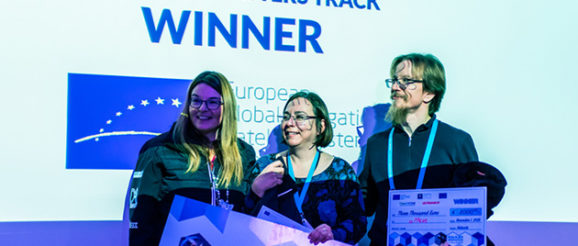uMaze takes Accuracy Matters prize in Galileo Innovation Challenge

The Finnish team uMaze was declared the winner of the GSA’s Accuracy Matters challenge in the Galileo Innovation Challenge, which took place at Traficom Headquarters – Dynamicum, in Helsinki on 29 November – 1 December. The hackathon was organised by Ultrahack, with support from the Finnish Transport and Communications Agency (Traficom) and European Space Week. The European GNSS Agency (GSA) acted as a partner, providing mentors and judges and sponsoring a challenge.
The contenders for the challenge were tasked with designing, developing and demonstrating a beta version of an innovative application that benefits from Galileo’s enhanced accuracy. In total, seven teams of innovators and developers from around the world took up the challenge, and worked over the three days to either create a new app or enhance an existing one to demonstrate how accurate positioning adds value in a variety of use cases.
The top four
uMaze took the EUR 3000 first prize for their app, which creates mazes in specific outdoor areas in which users can play. The uMaze team also reached the finals of the MyGalileoApp competition. Since then, they have taken their app to the next level, increasing accuracy and including a function that informs users when the phone’s Galileo positioning is working. Given the level of precision required by the mazes, the user experience really depends on whether the phone has Galileo, so it scored highly on the hackathon’s ‘Galileo relevance’ criterion.
Read this: First Galileo-enabled autonomous vehicle successfully demonstrated
“For its part, Traficom wants to help Finnish industry and application developers to be at the forefront in introducing new services based on the Galileo system. The objective of the Galileo Innovation Challenge is to raise public awareness about European satellite navigation and support application developers in creating more solutions based on Galileo,” says Senior Specialist Tero Vihavainen from Traficom.
There was a tie for second prize of EUR 2000 between the Heim.tech and Kill it before it Kills You teams. The Heim.tech app monitors and manages wild fires using a drone equipped with a very sensitive thermal sensor to detect even small fires; a mobile app for people on the ground, and a user interface for controlling operations.
At the hackathon they focused only on the mobile app interface for managing assets and resources on the ground, mapping distances to the fire, calculating the human and material resources needed to reach the fire, providing an overview of where the fire is growing, and optimising the speed and efficiency of the response.
The Kill it before it Kills You app, which monitors the spread of contagious diseases, consists of two parts: one for the disease control centre and one for the infected patient. The app creates heat maps for contagious diseases and also tracks infected people, monitoring where the disease might spread.
The idea is that when infected people go to hospital and are diagnosed, they are given free drugs in exchange for using the app to track where they go. The business case is that prevention is cheaper than cure, and that only by having a clear overview of where a disease is spreading will it be possible to put crisis centres in place and organise a targeted response.
And this: MyGalileoApp: the results are in!
Finally, third prize worth EUR 1000, went to the Approach team, for their crowdsourced app for climbers. The app is able to pinpoint arrival and destination marks for a climb and, based on user input, calculate the optimal path for reaching a climbing destination. The app uses the enhanced positioning of Galileo, pinpointing every step of the climb and mapping the continuous decision-making process of climbers as they navigate the most secure paths.
“All of the apps presented at the Galileo Innovation Challenge rely on the positioning provided by GNSS and Galileo, the apps that we supported and evaluated as part of the ‘Accuracy Matters’ stream really took advantage of Galileo and dual frequency, to the point that accuracy really determined the outcome and quality of the user experience,” said Justyna Redelkiewicz Musial, in charge of LBS and IoT market development at the GSA.
“App developers are a great community to work with because they completely understand the ‘user-centric’ ethos which is also at the heart of our work at the GSA,” she said.
Quantum leap progress
All the winning apps made quantum leap progress during the 48 hours of the hackathon and made the most of the support provided by the GSA in terms of strategic guidance, technical mentoring and business development.
Along with the cash prizes the top three teams will be able to take advantage of some one-to-one coaching on preparing an application to the Finnish ESA Business Incubation Centre, where the value of the potential incubation amounts to EUR 75 000 EUR. The winning teams will also get the opportunity to network with a wide selection of potential investors at European Space Week, which is taking place immediately after the Galileo Innovation Challenge, at Helsinki Congress Paasitorni on 3-5 December.
Media note: This feature can be republished without charge provided the European GNSS Agency (GSA) is acknowledged as the source at the top or the bottom of the story. You must request permission before you use any of the photographs on the site. If you republish, we would be grateful if you could link back to the GSA website (http://www.gsa.europa.eu).
